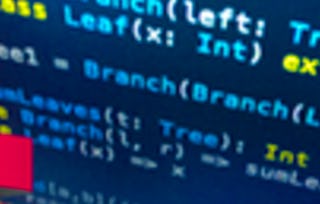Functional programming is becoming increasingly widespread in industry. This trend is driven by the adoption of Scala as the main programming language for many applications. Scala fuses functional and object-oriented programming in a practical package. It interoperates seamlessly with both Java and Javascript. Scala is the implementation language of many important frameworks, including Apache Spark, Kafka, and Akka. It provides the core infrastructure for sites such as Twitter, Tumblr and also Coursera.

Functional Programming Principles in Scala (Scala 2 version)
Seize the savings! Get 40% off 3 months of Coursera Plus and full access to thousands of courses.

Functional Programming Principles in Scala (Scala 2 version)

Instructor: Martin Odersky
8,164 already enrolled
Included with
65 reviews
Recommended experience
What you'll learn
Understand the principles of functional programming
Write purely functional programs, using recursion, pattern matching, and higher-order functions
Design immutable data structures
Combine functional programming with objects and classes
Skills you'll gain
Tools you'll learn
Details to know

Add to your LinkedIn profile
1 assignment
See how employees at top companies are mastering in-demand skills

There are 6 modules in this course
Get up and running with Scala on your computer. Complete an example assignment to familiarize yourself with our unique way of submitting assignments. In this week, we'll learn the difference between functional imperative programming. We step through the basics of Scala; covering expressions, evaluation, conditionals, functions, and recursion
What's included
11 videos7 readings1 assignment3 programming assignments
This week, we'll learn about functions as first-class values, and higher order functions. We'll also learn about Scala's syntax and how it's formally defined. Finally, we'll learn about methods, classes, and data abstraction through the design of a data structure for rational numbers.
What's included
7 videos2 programming assignments
This week, we'll cover traits, and we'll learn how to organize classes into hierarchies. We'll cover the hierarchy of standard Scala types, and see how to organize classes and traits into packages. Finally, we'll touch upon the different sorts of polymorphism in Scala.
What's included
3 videos2 programming assignments
This week we'll learn about the relationship between functions and objects in Scala; functions *are* objects! We'll zoom in on Scala's type system, covering subtyping and generics, and moving on to more advanced aspects of Scala's type system like variance. Finally, we'll cover Scala's most widely used data structure, Lists, and one of Scala's most powerful tools, pattern matching.
What's included
7 videos2 programming assignments
This week we dive into Lists, the most commonly-used data structure in Scala.
What's included
7 videos
After a deep-dive into Lists, this week we'll explore other data structures; vectors, maps, ranges, arrays, and more. We'll dive into Scala's powerful and flexible for-comprehensions for querying data.
What's included
6 videos2 programming assignments
Instructor

Offered by
Explore more from Software Development
 Status: Free Trial
Status: Free TrialÉcole Polytechnique Fédérale de Lausanne
 Status: Preview
Status: PreviewÉcole Polytechnique Fédérale de Lausanne
 Status: Free Trial
Status: Free TrialÉcole Polytechnique Fédérale de Lausanne
 Status: Free Trial
Status: Free TrialÉcole Polytechnique Fédérale de Lausanne
Why people choose Coursera for their career

Felipe M.

Jennifer J.

Larry W.

Chaitanya A.
Learner reviews
- 5 stars
81.53%
- 4 stars
16.92%
- 3 stars
1.53%
- 2 stars
0%
- 1 star
0%
Showing 3 of 65
Reviewed on Dec 16, 2022
The course gives a much deeper understanding than a basic course on Scala. It's from the Scala creator himself.Martin is the best
Reviewed on Nov 27, 2021
A bit academic at times but that is the nature of scala
Reviewed on Jan 5, 2023
The course offers a good introduction to Scala and Functional Programming principles. I learned a lot, thanks!

Open new doors with Coursera Plus
Unlimited access to 10,000+ world-class courses, hands-on projects, and job-ready certificate programs - all included in your subscription
Advance your career with an online degree
Earn a degree from world-class universities - 100% online
Join over 3,400 global companies that choose Coursera for Business
Upskill your employees to excel in the digital economy
Frequently asked questions
This course uses Scala 2. You can find a more recent version of the same course based on the latest stable version of Scala here.
To access the course materials, assignments and to earn a Certificate, you will need to purchase the Certificate experience when you enroll in a course. You can try a Free Trial instead, or apply for Financial Aid. The course may offer 'Full Course, No Certificate' instead. This option lets you see all course materials, submit required assessments, and get a final grade. This also means that you will not be able to purchase a Certificate experience.
When you purchase a Certificate you get access to all course materials, including graded assignments. Upon completing the course, your electronic Certificate will be added to your Accomplishments page - from there, you can print your Certificate or add it to your LinkedIn profile.
More questions
Financial aid available,

